Abstract
The concentrations of the amino terminal propeptide of type III procollagen, the 7S domain of type IV collagen, and the fragment P1 of laminin (PIIINP, 7S, and P1 respectively) and the activity of galactosylhydroxylysyl glucosyltransferase (GGT) in serum were evaluated as indicators of disease activity in a cross sectional study of 84 patients with progressive systemic sclerosis. The mean values of PIIINP, P1, and GGT were raised in progressive systemic sclerosis, 19-32% of patients having abnormal values of the various tests. PIIINP, measured with two different assays, and P1 were associated with active, acute, or subacute disease. GGT also correlated positively with some acute phase proteins in the whole group, without a clear association with the course of the disease. Arthritis was associated with increased PIIINP concentrations as well as with an increased activity of GGT. Kidney disease led to raised concentrations of the degradation products of PIIINP. Raynaud's phenomenon in the hands was related to increased PIIINP concentrations.
Full text
PDF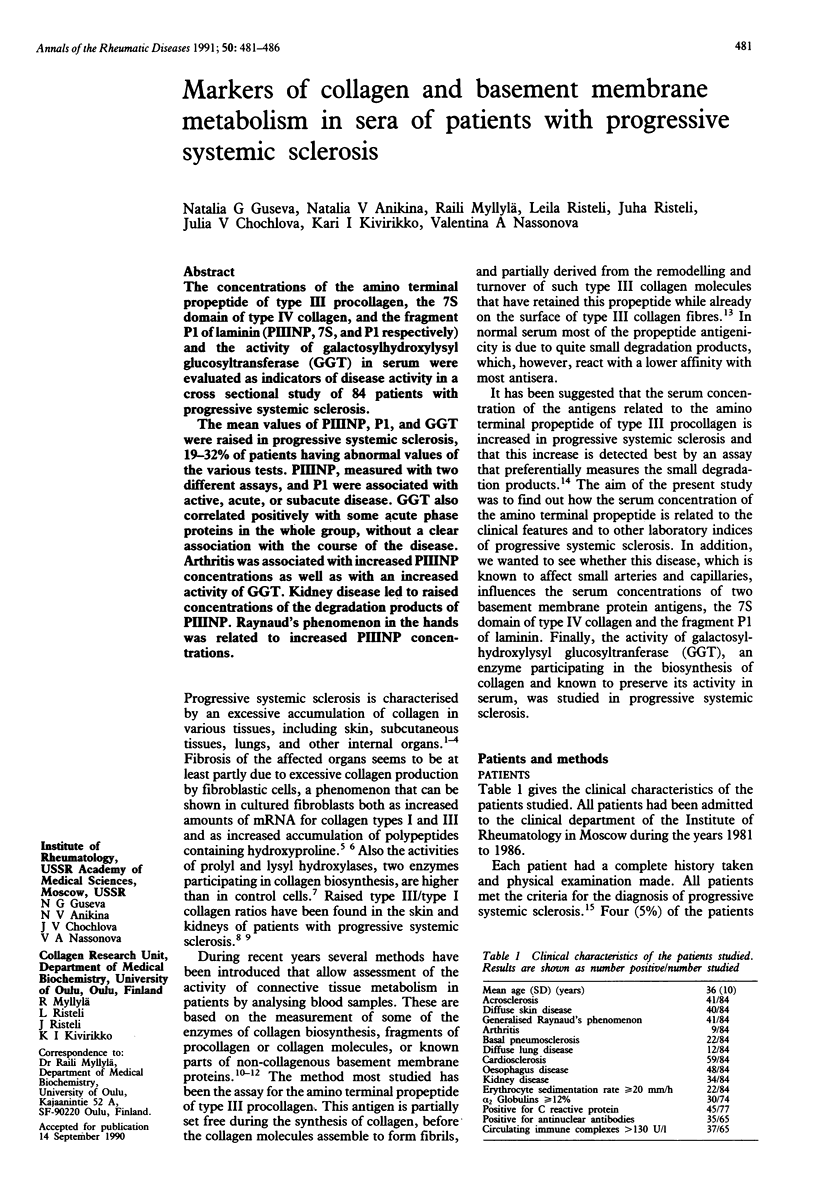
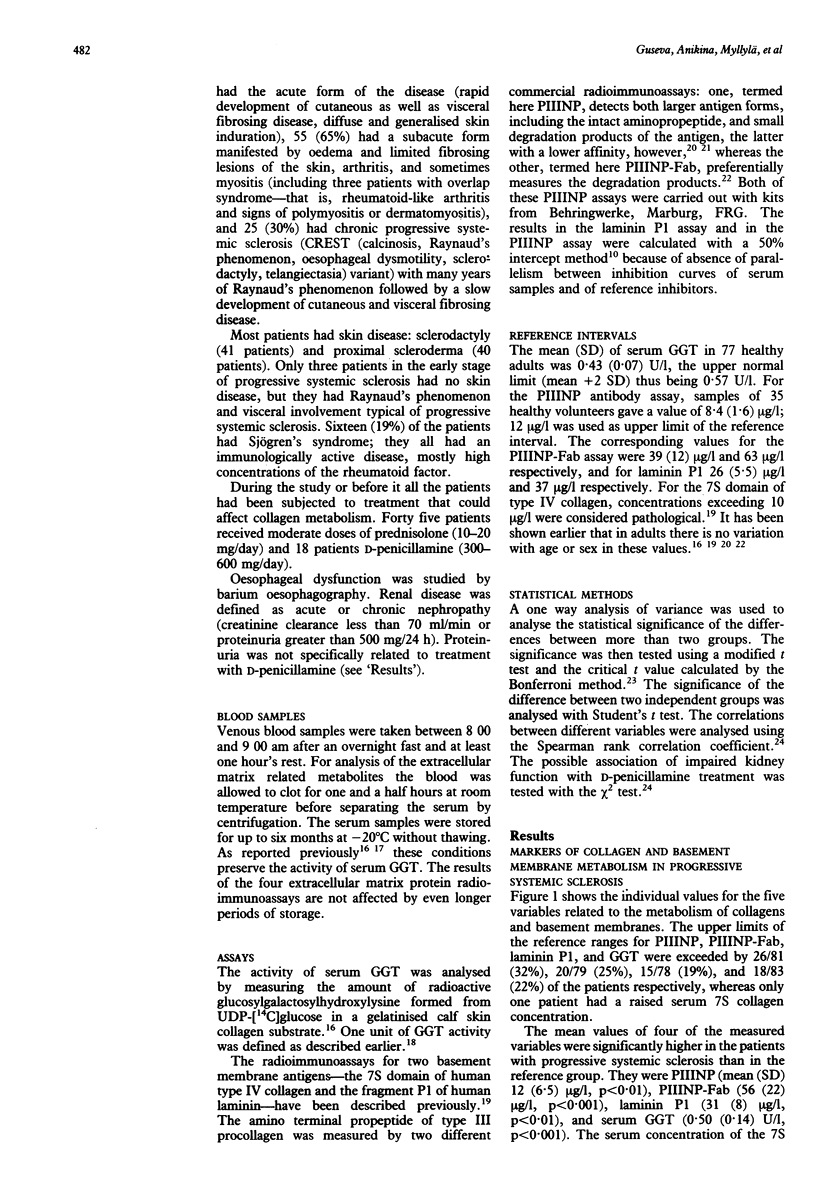
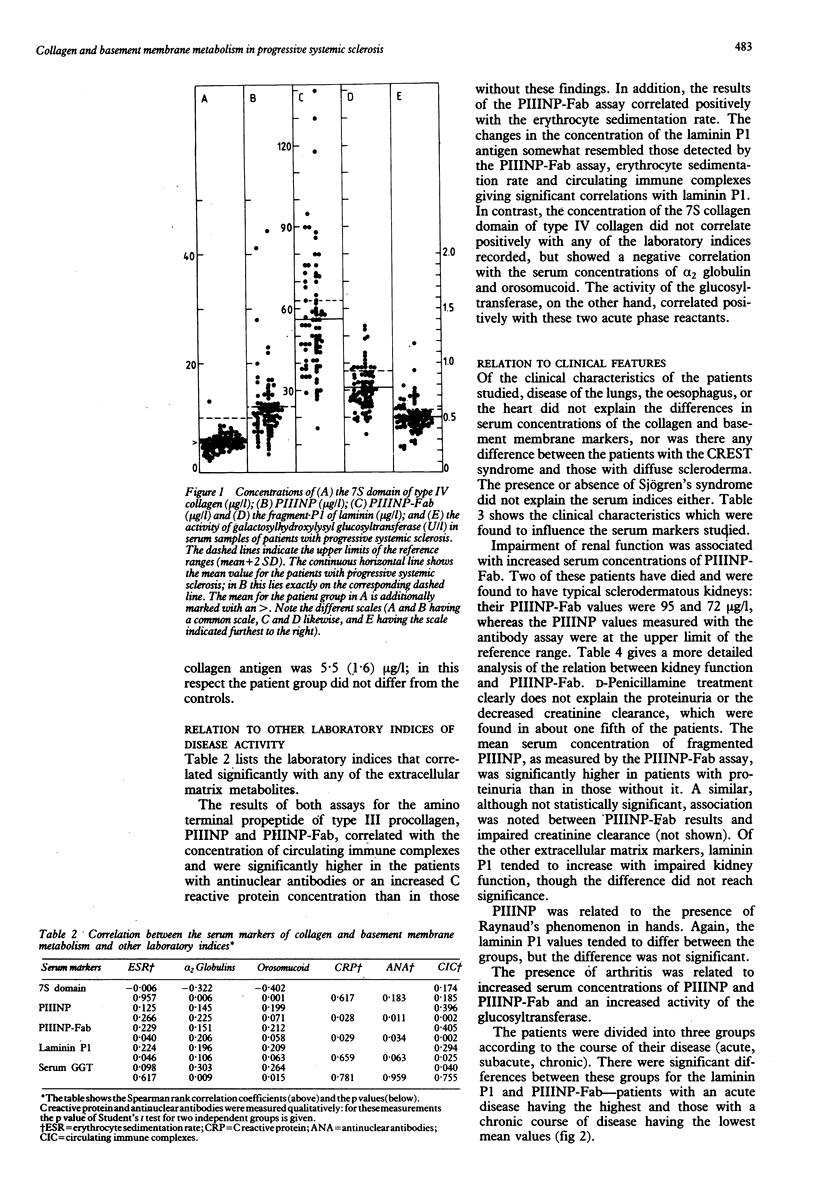
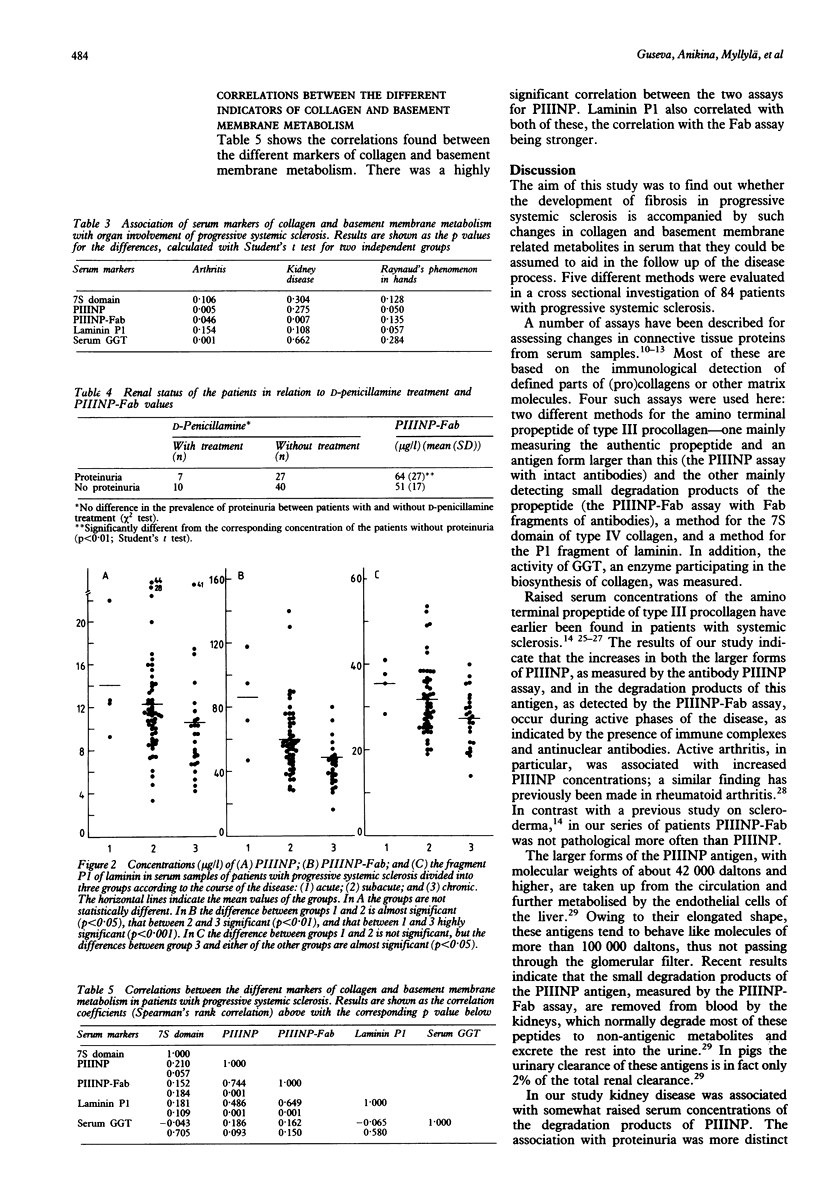
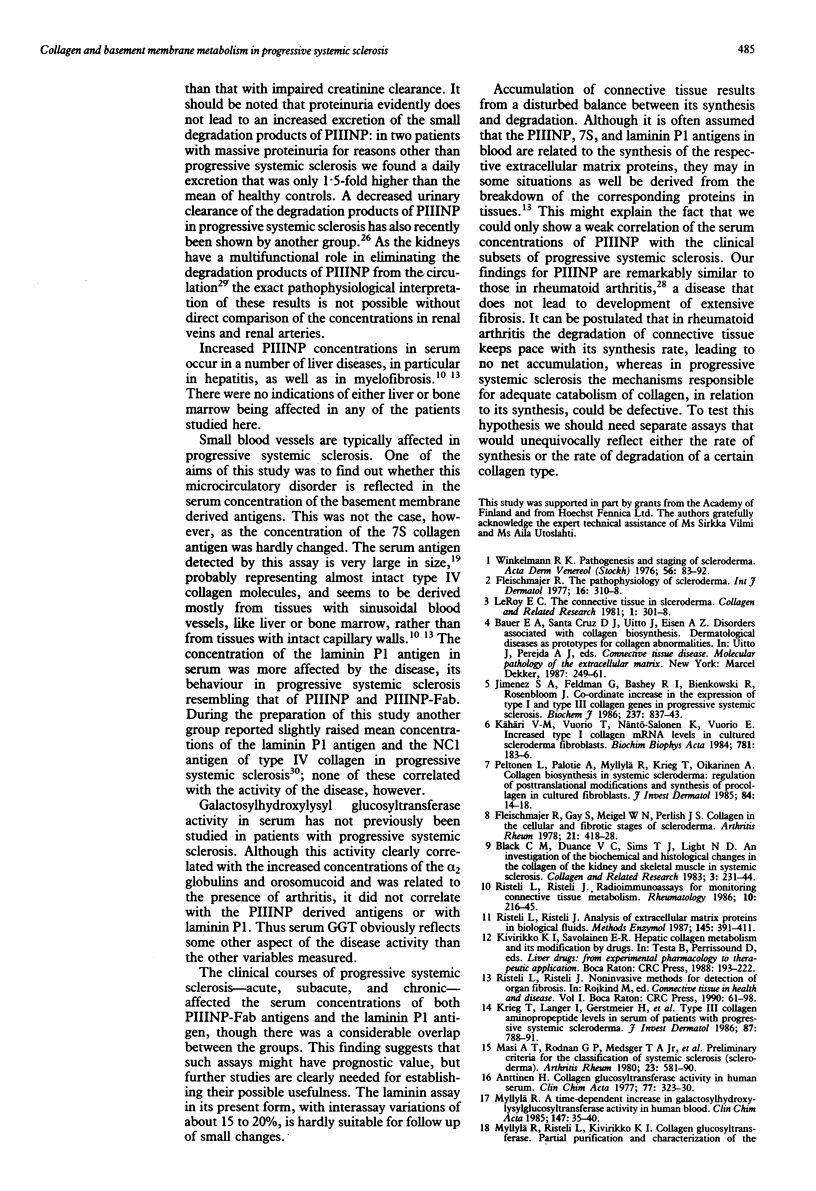
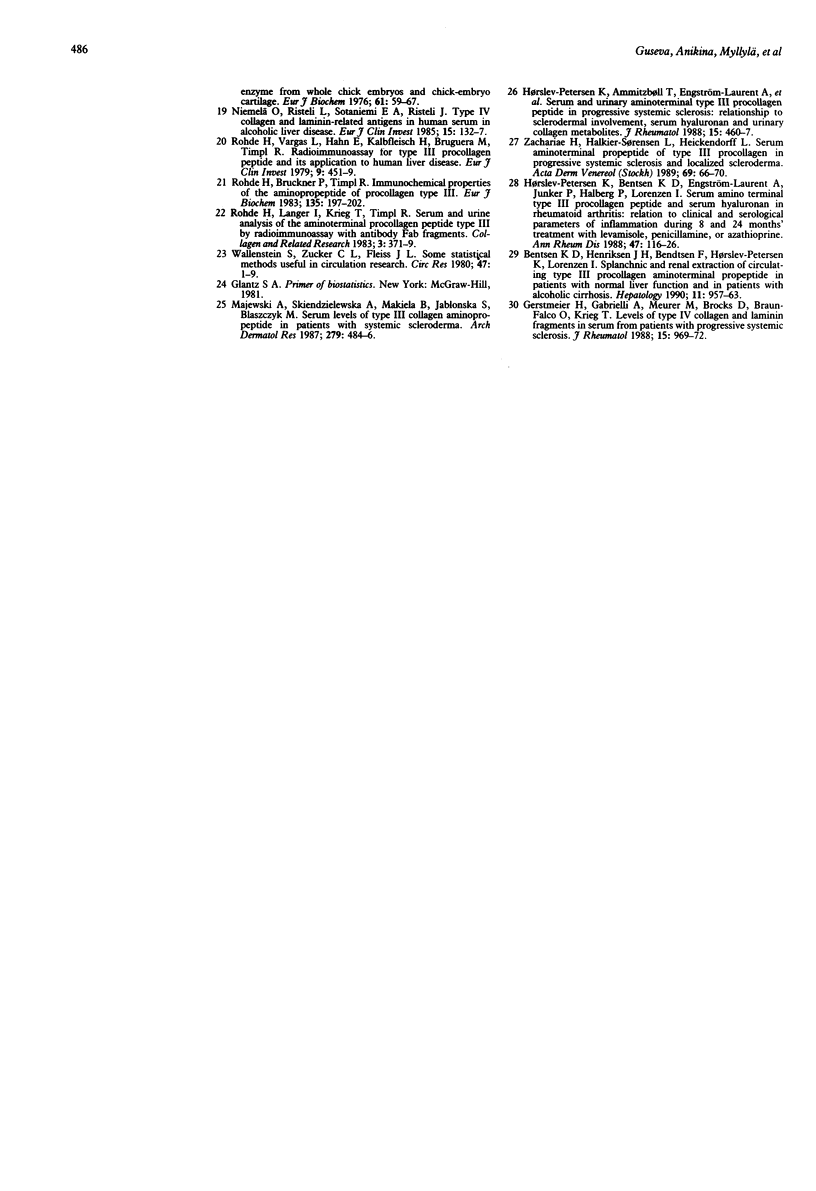
Selected References
These references are in PubMed. This may not be the complete list of references from this article.
- Anttinen H. Collagen glucosyltransferases activity in human serum. Clin Chim Acta. 1977 Jun 15;77(3):323–330. doi: 10.1016/0009-8981(77)90236-4. [DOI] [PubMed] [Google Scholar]
- Bentsen K. D., Henriksen J. H., Bendtsen F., Hørslev-Petersen K., Lorenzen I. Splanchnic and renal extraction of circulating type III procollagen aminoterminal propeptide in patients with normal liver function and in patients with alcoholic cirrhosis. Hepatology. 1990 Jun;11(6):957–963. doi: 10.1002/hep.1840110608. [DOI] [PubMed] [Google Scholar]
- Black C. M., Duance V. C., Sims T. J., Light N. D. An investigation of the biochemical and histological changes in the collagen of the kidney and skeletal muscle in systemic sclerosis. Coll Relat Res. 1983 May;3(3):231–243. doi: 10.1016/s0174-173x(83)80006-5. [DOI] [PubMed] [Google Scholar]
- Fleischmajer R., Gay S., Meigel W. N., Perlish J. S. Collagen in the cellular and fibrotic stages of scleroderma. Arthritis Rheum. 1978 May;21(4):418–428. doi: 10.1002/art.1780210404. [DOI] [PubMed] [Google Scholar]
- Fleischmajer R. The pathophysiology of scleroderma. Int J Dermatol. 1977 Jun;16(5):310–318. doi: 10.1111/j.1365-4362.1977.tb00747.x. [DOI] [PubMed] [Google Scholar]
- Hørslev-Petersen K., Ammitzbøll T., Engström-Laurent A., Bentsen K., Junker P., Asboe-Hansen G., Lorenzen I. Serum and urinary aminoterminal type III procollagen peptide in progressive systemic sclerosis: relationship to sclerodermal involvement, serum hyaluronan and urinary collagen metabolites. J Rheumatol. 1988 Mar;15(3):460–467. [PubMed] [Google Scholar]
- Hørslev-Petersen K., Bentsen K. D., Engström-Laurent A., Junker P., Halberg P., Lorenzen I. Serum amino terminal type III procollagen peptide and serum hyaluronan in rheumatoid arthritis: relation to clinical and serological parameters of inflammation during 8 and 24 months' treatment with levamisole, penicillamine, or azathioprine. Ann Rheum Dis. 1988 Feb;47(2):116–126. doi: 10.1136/ard.47.2.116. [DOI] [PMC free article] [PubMed] [Google Scholar]
- Jimenez S. A., Feldman G., Bashey R. I., Bienkowski R., Rosenbloom J. Co-ordinate increase in the expression of type I and type III collagen genes in progressive systemic sclerosis fibroblasts. Biochem J. 1986 Aug 1;237(3):837–843. doi: 10.1042/bj2370837. [DOI] [PMC free article] [PubMed] [Google Scholar]
- Krieg T., Langer I., Gerstmeier H., Keller J., Mensing H., Goerz G., Timpl R. Type III collagen aminopropeptide levels in serum of patients with progressive systemic scleroderma. J Invest Dermatol. 1986 Dec;87(6):788–791. doi: 10.1111/1523-1747.ep12459865. [DOI] [PubMed] [Google Scholar]
- Kähäri V. M., Vuorio T., Näntö-Salonen K., Vuorio E. Increased type I collagen mRNA levels in cultured scleroderma fibroblasts. Biochim Biophys Acta. 1984 Feb 24;781(1-2):183–186. doi: 10.1016/0167-4781(84)90136-2. [DOI] [PubMed] [Google Scholar]
- Majewski S., Skiendzielewska A., Makieła B., Jablońska S., Błaszczyk M. Serum levels of type III collagen aminopropeptide in patients with systemic scleroderma. Arch Dermatol Res. 1987;279(7):484–486. doi: 10.1007/BF00412596. [DOI] [PubMed] [Google Scholar]
- Myllylä R. A time-dependent increase in galactosylhydroxylysyl glucosyltransferase activity in human blood. Clin Chim Acta. 1985 Mar 30;147(1):35–40. doi: 10.1016/0009-8981(85)90008-7. [DOI] [PubMed] [Google Scholar]
- Myllylä R., Risteli L., Kivirikko K. I. Collagen glucosyltransferase. Partial purification and characterization of the enzyme from whole chick embryos and chick-embryo cartilage. Eur J Biochem. 1976 Jan 2;61(1):59–67. doi: 10.1111/j.1432-1033.1976.tb09997.x. [DOI] [PubMed] [Google Scholar]
- Niemelä O., Risteli L., Sotaniemi E. A., Risteli J. Type IV collagen and laminin-related antigens in human serum in alcoholic liver disease. Eur J Clin Invest. 1985 Jun;15(3):132–137. doi: 10.1111/j.1365-2362.1985.tb00156.x. [DOI] [PubMed] [Google Scholar]
- Peltonen L., Palotie A., Myllylä R., Krieg T., Oikarinen A. Collagen biosynthesis in systemic scleroderma: regulation of posttranslational modifications and synthesis of procollagen in cultured fibroblasts. J Invest Dermatol. 1985 Jan;84(1):14–18. doi: 10.1111/1523-1747.ep12274596. [DOI] [PubMed] [Google Scholar]
- Preliminary criteria for the classification of systemic sclerosis (scleroderma). Subcommittee for scleroderma criteria of the American Rheumatism Association Diagnostic and Therapeutic Criteria Committee. Arthritis Rheum. 1980 May;23(5):581–590. doi: 10.1002/art.1780230510. [DOI] [PubMed] [Google Scholar]
- Risteli L., Risteli J. Analysis of extracellular matrix proteins in biological fluids. Methods Enzymol. 1987;145:391–411. doi: 10.1016/0076-6879(87)45022-2. [DOI] [PubMed] [Google Scholar]
- Rohde H., Bruckner P., Timpl R. Immunochemical properties of the aminopropeptide of procollagen type III. Eur J Biochem. 1983 Sep 15;135(2):197–202. doi: 10.1111/j.1432-1033.1983.tb07637.x. [DOI] [PubMed] [Google Scholar]
- Rohde H., Langer I., Krieg T., Timpl R. Serum and urine analysis of the aminoterminal procollagen peptide type III by radioimmunoassay with antibody Fab fragments. Coll Relat Res. 1983 Sep;3(5):371–379. doi: 10.1016/s0174-173x(83)80018-1. [DOI] [PubMed] [Google Scholar]
- Rohde H., Vargas L., Hahn E., Kalbfleisch H., Bruguera M., Timpl R. Radioimmunoassay for type III procollagen peptide and its application to human liver disease. Eur J Clin Invest. 1979 Dec;9(6):451–459. doi: 10.1111/j.1365-2362.1979.tb00912.x. [DOI] [PubMed] [Google Scholar]
- Wallenstein S., Zucker C. L., Fleiss J. L. Some statistical methods useful in circulation research. Circ Res. 1980 Jul;47(1):1–9. doi: 10.1161/01.res.47.1.1. [DOI] [PubMed] [Google Scholar]
- Winkelmann R. K. Pathogenesis and staging of scleroderma. Acta Derm Venereol. 1976;56(2):83–92. [PubMed] [Google Scholar]
- Zachariae H., Halkier-Sørensen L., Heickendorff L. Serum aminoterminal propeptide of type III procollagen in progressive systemic sclerosis and localized scleroderma. Acta Derm Venereol. 1989;69(1):66–70. [PubMed] [Google Scholar]


